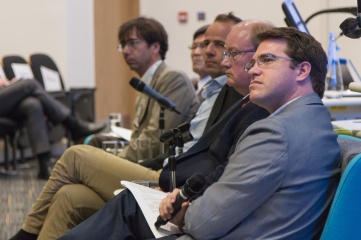The reasons behind the evolving event hosting landscape can be debated: better informed government officials; a new point of view from the public; PR-sensitive executives thinking about impact on sponsors – but there is no disputing that a major shift has occurred in the global event hosting landscape. The referendums and political hand-wringing taking place before major event bidding are prime examples of this evolution.
This “new normal” provides a unique opportunity for government and rightsholders to align on mutually-beneficial outcomes, with both sides required to come to the bargaining table with current and accurate data to develop a plan that has meaningful results for the host community.
Government can, and should, take responsibility for the pre-event work. Through online surveys, social listening and in-person attendance at community meetings, government officials can develop a firm understanding of the outcomes a host community would find most useful. This informed perspective will allow government officials to have direct conversations with rightsholders – a critical portion of the conversation that is often not addressed. Rightsholders are often willing to consider working with a government to provide them what they need, but typically, the government simply responds with “what are you offering” instead of leveraging this opportunity to create a meaningful impact. To create a meaningful environment of partnership and collaboration, government officials must approach this moment with specific deliverables the host community seeks.
Government officials should come to the table with key pieces of data in-hand:
- Preferred sport or cultural activity of your constituents, by neighborhood, would allow government and rightsholders to focus on specific areas of a city that could be more receptive and supportive of hosting the event
- Education, arts, and health and wellness needs, by neighborhood, would allow government and rightsholders to consider short-term impact and long-term legacy plans that result in locally meaningful outcomes
- Planned infrastructure development would allow government and rightsholders to accurately involve event-necessary works to be integrated into already planned and funded projects
- Economic development goals, by neighborhood, would allow government and rightsholders to understand which local businesses can be event partners
- Tourism data that explains hotel occupancy, visitors by market, interest and spend, in addition to plans for growth into future markets
Throughout the lead-up to the event, during the event and post-event, rightsholders should evolve beyond event producer to community partner. With the understanding that taking any free minute away from event preparation is difficult, elevating the needs of the host community into the day-to-day decision-making process has many benefits. This mindset has the potential to result in a host community that:
- Strives for a positive event experience for participants, staff and partners
- Understands and appreciates the event’s tangible and intangible outcomes
- Attends the main event and supports ancillary events
- Enthusiastically welcomes the event’s return
Rightsholders also have the opportunity to significantly increase their positive impact on the host community by organizing their partners, sponsors, participants, fans and investors. Each one of these stakeholder groups has a vested interest in the success of the event, and therefore, has a vested interested in the host community. The greater understanding the rightsholder has of the social responsibility and financial goals of each stakeholder group, the better alignment they can foster with an informed government and interested host community.
This approach may require rightsholders to reconsider which members of their organization have influence in their strategic planning. Specifically, rightsholders will need to examine if the most significant decisions their organization undertakes are weighed fully against commercial and community benefits. The rightsholders that can maximize commercial returns around community-focused decisions are the organizations that are most well-prepared for this moment in time.
Lastly, rightsholders must understand government. There are many factors that influence the government decision-making process and pace. For instance, your event may align with all of the goals of the government, but it may not be an ideal time for a government leader to commit to your event from a political perspective. This is just one example of the difficult and frustrating process of working with government. In these situations, try and help your government partner get to “yes”. If there’s a groundswell of support from the community for hosting your event, then committing to the event just became a lot easier.
Improved and informed dialogue between government and rightsholders has the potential to deliver results to host communities that they find meaningful and transformational, while keeping rightsholders commercially successful. With data-driven insights and measured outcomes at the center of these negotiations, plans and work, this moment of event hosting evolution can result in events driving meaningful transformation in neighborhoods, cities and countries.
About the Author
Mike Hopper has spent his career at the intersection of sports, government and community relations, while working side-by-side with Mike Bloomberg and George Steinbrenner.
Prior to establishing Advance Brand Consulting, Mike held senior positions with SPORTS195, Teneo Consulting, NYC & Company – NYC’s Official Tourism & Marketing Bureau, the New York City Mayor’s Office, and the New York Yankees. He now leads Advance Brand Consulting, which focuses on cultivating the relationship between sports leagues and teams, governments and communities, to ensure each party achieves their goals while understanding the goals of the others.
Mike Hopper spoke at Host City 2015, the largest meeting of sports, business and cultural events.


